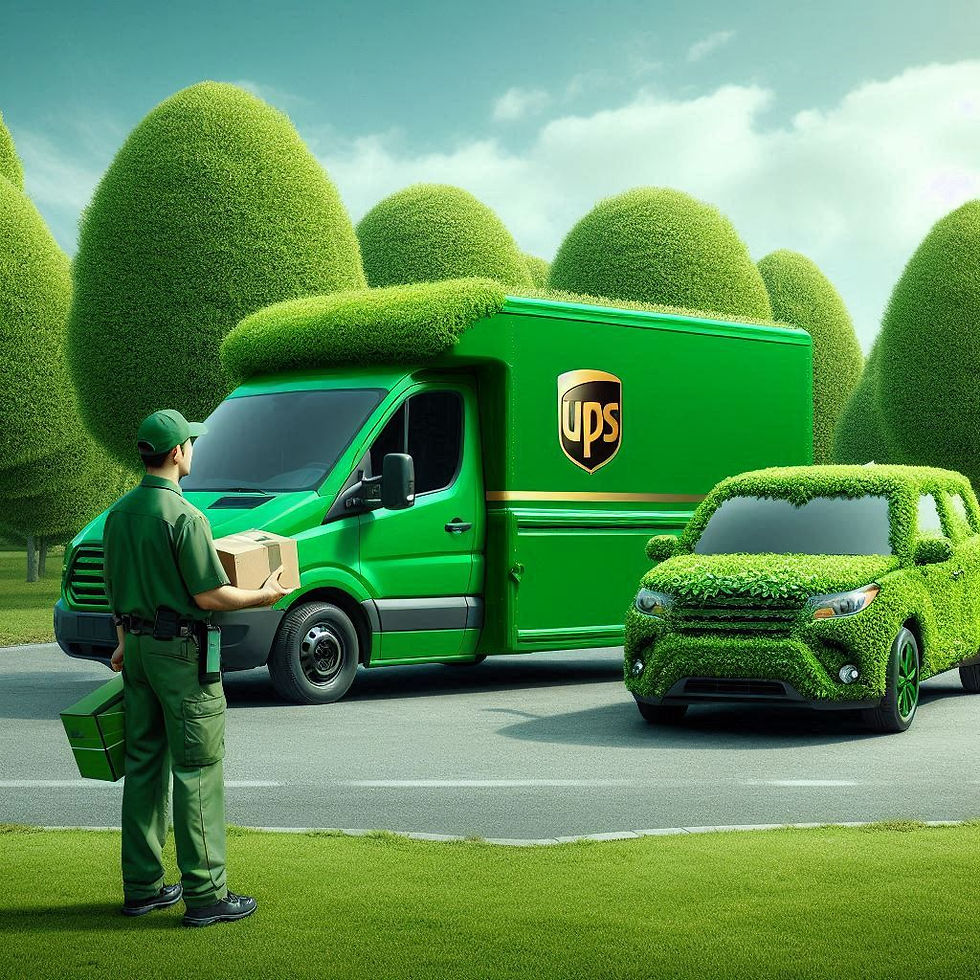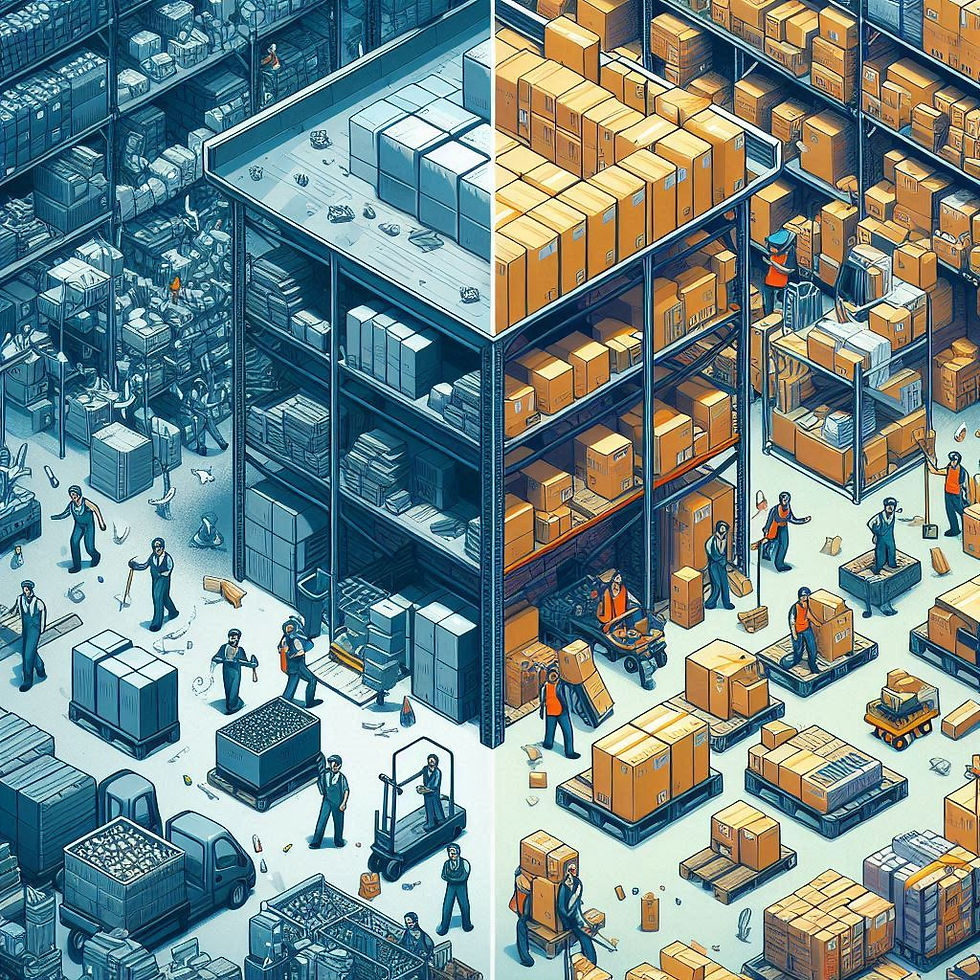Why Green Fulfilment Is the Key to Sustainable eCommerce Growth
- Compare3PLs.com

- 7 days ago
- 5 min read
As the world becomes more eco-conscious, sustainable business practices are no longer a “nice-to-have” — they’re an essential. This is especially true for the booming eCommerce sector, where convenience often comes with an environmental cost. From overpackaged goods to high-emission deliveries, the impact of online shopping is significant. But what if there was a way to reduce that footprint without sacrificing efficiency?
That’s where green fulfilment comes in.
At Compare3PLs.com, we help brands of all sizes compare third-party logistics (3PL) providers that not only meet their performance needs, but also align with their environmental values. If you're looking to integrate sustainability into your supply chain, this guide is for you.

What Is Green Fulfilment?
Green fulfilment refers to the process of fulfilling orders in an environmentally responsible way. It’s about reducing waste, lowering carbon emissions, and making choices throughout the fulfilment process that minimise harm to the planet.
From warehouse energy use to packaging materials and delivery methods, green fulfilment considers every step in the chain and asks: how can we do this better, cleaner, and more sustainably?
This could include:
Using recyclable or compostable packaging
Digitising paperwork to reduce paper use
Partnering with couriers who operate electric vehicles
Working with 3PL providers who are Carbon Neutral certified
Reducing warehouse emissions through green energy
Green fulfilment is not just about ticking boxes — it’s about taking real, measurable steps towards sustainability.
Why Green Fulfilment Matters
The environmental cost of eCommerce is rising. A 2019 study estimated that online retail generates over 1 million tonnes of plastic waste annually — and that figure is only increasing. What’s more, only around 9% of that plastic gets recycled, with the rest heading to landfill or polluting our oceans.
And that’s just packaging.
Add in carbon emissions from shipping, the energy consumption of warehouses, and the short lifecycle of many eCommerce goods, and it’s clear that the sector has a problem. But consumers are paying attention.
A 2024 UK consumer report found that:
73% of online shoppers would switch to a brand with better sustainability practices.
58% are actively seeking out eco-friendly packaging.
65% said they expect businesses to reduce their carbon footprint as part of their growth plans.
In short, going green isn’t just good for the planet — it’s good for business too.
How Can eCommerce Companies Achieve Green Fulfilment?
Shifting to green fulfilment doesn’t require an overhaul overnight. Small changes add up. Here are some key steps that eCommerce retailers and logistics providers can take:
1. Switch to Sustainable Packaging Suppliers
Packaging is often the most visible (and wasteful) aspect of online fulfilment. Plastic mailers, bubble wrap, polystyrene peanuts — they all contribute to a growing environmental crisis.
Instead, opt for:
Recyclable cardboard boxes
Compostable mailers
Paper-based protective fillers
Water-based inks for branding
Some packaging suppliers, such as Lil Packaging, offer plastic-free, FSC-certified materials and carbon offset options. They’ve helped countless businesses cut waste without sacrificing packaging performance or aesthetics.
At Compare3PLs.com, many of the 3PL providers we feature already work with sustainable packaging companies. It’s worth comparing your options to find a 3PL that aligns with your green goals.
2. Go Paperless with Digital Systems
From order slips to warehouse instructions and invoices, paper usage can pile up. Going digital can reduce office and warehouse paper waste by over 50%, especially when combined with cloud-based warehouse management systems (WMS).
Look for a 3PL partner that offers:
Paperless pick and pack processes
Digital invoicing and returns
Electronic inventory management
Customer-facing digital tracking
Aside from sustainability, digitisation improves speed, accuracy, and customer experience — all while saving trees.
3. Choose Couriers with Green Initiatives
Choosing the fastest courier is great — but what if they could be fast and environmentally responsible?
Many major couriers in the UK are now investing in green logistics, including:
Electric and hybrid delivery vehicles
Urban delivery hubs to reduce long-haul emissions
Tree-planting initiatives and carbon offsetting
Eco-packaging partnerships
Some examples:
DPD UK aims to have a fully electric fleet in all major cities by 2030.
Royal Mail has introduced e-trikes and micro electric vans in urban centres.
Evri (formerly Hermes) is trialling parcel deliveries using cargo bikes and foot couriers.
When comparing 3PLs, check whether they partner with eco-conscious couriers — it's a win for both your sustainability policy and your customers.
4. Work with a Green-Focused 3PL
If you’re outsourcing your fulfilment to a third party, it’s crucial that they align with your environmental values.
Here’s what to look for in a green 3PL:
Carbon Neutral certification (e.g. through Carbon Neutral Britain)
Use of renewable energy in warehouses
LED lighting and energy-efficient operations
Waste separation and recycling processes
Regular green audits and improvement plans
Some 3PLs even take it further by integrating solar panels, using electric forklifts, or offering a zero-emissions delivery option for specific regions.
At Compare3PLs.com, we showcase fulfilment providers who lead by example in sustainability. Whether you’re looking for carbon neutrality, circular packaging loops, or just better energy efficiency — we’ll help you find a match.
Bonus: Think Circular, Not Just Sustainable
Green fulfilment isn’t only about reducing impact — it’s about rethinking how your business operates. That’s where circular economy principles come in.
Instead of a linear model (make, sell, dispose), circular fulfilment encourages:
Returnable packaging – boxes and totes that customers send back
Reusable containers in warehousing and distribution
Refurbishment and resale programmes for returned goods
Recommerce platforms for second-hand or reconditioned items
Several fulfilment providers in the UK now offer reverse logistics designed specifically for circular businesses.
Certified Carbon Neutral: The Gold Standard
Some 3PLs go beyond good intentions and secure Carbon Neutral Certification from bodies like Carbon Neutral Britain or ClimatePartner.
This means they’ve:
Calculated their emissions
Reduced emissions where possible
Offset the remainder through verified projects (like reforestation or clean energy)
Working with a Carbon Neutral 3PL not only supports your business’s sustainability targets but also gives you a valuable marketing edge — many consumers actively seek carbon-neutral brands.
When comparing providers on Compare3PLs.com, look for the Carbon Neutral Certified badge for added peace of mind.
Final Thoughts: Greener Fulfilment Is the Future
As environmental awareness grows, businesses that embrace green fulfilment will be better positioned to meet both regulatory demands and consumer expectations.
It’s no longer about whether you should go green — it’s about how quickly and effectively you can do it.
At Compare3PLs.com, we help you find the right fulfilment partner — one that delivers not just parcels, but on your sustainability promise. Our platform makes it easy to compare 3PL providers across the UK based on speed, service quality, price and — crucially — eco credentials.
🌿 Ready to go green? Use our free 3PL comparison tool to find fulfilment partners who share your values and your vision for a cleaner future.
About Compare3PLs.com We’re the UK’s leading platform for comparing third-party logistics providers. Whether you’re scaling your online store, launching a new product line, or simply looking for a more sustainable fulfilment partner, we make the process easy — and free.



